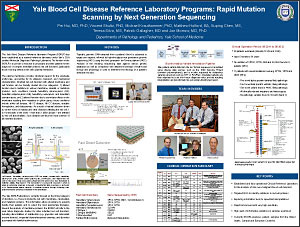Yale Blood Cell Disease Reference Laboratory Programs: Rapid Mutation Scanning by Next Generation Sequencing
Pei Hui, MD, PhD, Vincent Shultz, PhD, Michael Krauthammer, PhD, Matthew Holford, BA, Suping Chen, MS, Teresa Silva, MS, Patrick Gallagher, MD and Jon Morrow, MD, PhD
Departments of Pathology and Pediatrics, Yale School of Medicine, New Haven, CT, USA
INTRODUCTION
The Yale Blood Disease Reference laboratory Program (BDRLP) has been established as a national reference laboratory under Yale’s CLIA certified Molecular Diagnostic Pathology Laboratory. The function of the BDRLP is to provide a resource to physicians and their patients for the diagnosis of complex hereditary intrinsic red cell disorders, particularly those involving defects in the cell’s plasma membrane.
The plasma membrane provides structural support for the anucleate erythrocyte, accounting for its antigenic, transport, and mechanical characteristics. Inherited red cell disorders with altered membrane and cell function can be broadly divided into two categories: 1) altered function due to mutations in various membrane, skeletal, or metabolic proteins, such conditions include hereditary spherocytosis (HS), hereditary ellipotocytosis (HE), hereditary ovalocytosis, and hereditary stomatocytosis; and 2) altered function due to secondary effects on the membrane resulting from mutations in globin genes; these conditions include sickle cell disease, Hb SC disease, Hb CC disease, unstable hemoglobins, and thalassemias. As a result of natural selection driven by severe forms of malaria and other diseases affecting the red cell, 1 in 6 individuals in the world – more than 1 billion people – are affected by red cell abnormalities. Such diseases are thus the most common of all inherited disorders.
©2012 Yale Department of Pathology. All rights reserved.
Any redistribution or reproduction of part or all of the contents in any form is prohibited. You may not, except with express written permission of the author or the Department of Pathology, distribute or commercially exploit the content, nor may you transmit it or store it in any other website or other form of electronic retrieval system, including use for educational purposes.
